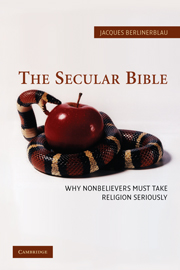Book contents
- Frontmatter
- Contents
- Preface and Acknowledgments
- Introduction: Secularists and the Not Godless World
- PART ONE THE COMPOSITION OF THE HEBREW BIBLE
- 1 “Who Wrote the Bible?”: Ancient Responses
- 2 “Who Wrote the Bible?”: Modern Responses
- 3 A Secular Answer to “Who Wrote the Bible?”
- PART TWO THE INTERPRETERS OF THE HEBREW BIBLE
- PART THREE POLITICS AND SCRIPTURE
- Conclusion: Beyond Church and State: New Directions for Secularism
- Notes
- Index of Biblical Citations
- Index of Qur'ānic Citations
- Index of Rabbinic, Early Jewish, and Patristic Citations
- Index
3 - A Secular Answer to “Who Wrote the Bible?”
Published online by Cambridge University Press: 05 June 2012
- Frontmatter
- Contents
- Preface and Acknowledgments
- Introduction: Secularists and the Not Godless World
- PART ONE THE COMPOSITION OF THE HEBREW BIBLE
- 1 “Who Wrote the Bible?”: Ancient Responses
- 2 “Who Wrote the Bible?”: Modern Responses
- 3 A Secular Answer to “Who Wrote the Bible?”
- PART TWO THE INTERPRETERS OF THE HEBREW BIBLE
- PART THREE POLITICS AND SCRIPTURE
- Conclusion: Beyond Church and State: New Directions for Secularism
- Notes
- Index of Biblical Citations
- Index of Qur'ānic Citations
- Index of Rabbinic, Early Jewish, and Patristic Citations
- Index
Summary
Ben Bag Bag said: Turn it [i.e., the Torah] over, and (again) turn it over, for all is therein.
Aboth 5:22Talking about texts as the products of authors, and authors meaning what they say. I suppose you'll say next that God sat and wrote down the Torah and all the commentaries, all seeing and all intending, of course
Allegra Goodman, Kaaterskill FallsIt is not unusual for very religious Jews and Christians to report that reading the Hebrew Bible is an incomparable experience. They tingle when they encounter the tale(s) of creation in Genesis. Isaiah's prophecies reduce them to tears. They are overcome by the most intense emotions when mouthing the Psalms. These psychological manifestations may have less to do with the objective literary qualities of these texts than with the subjective perceptions of believers. The pious ascribe the authorship of biblical books to, variously, God, the Holy Spirit, angels, and Moses, among others. With writers such as these is it any wonder that faithful readers will be awed?
By now, we have seen that no book of the Hebrew Bible claims to be written by God, the Holy Spirit, or angels. Nor do Hebrew Scriptures anywhere support the later Jewish and Christian insistence on the Mosaic authorship of the Pentateuch. But in all fairness to believers, it must be acknowledged that those who are mesmerized, enchanted, or afflicted by a “special” feeling when perusing Scripture are demonstrating sound literary instincts.
- Type
- Chapter
- Information
- The Secular BibleWhy Nonbelievers Must Take Religion Seriously, pp. 42 - 54Publisher: Cambridge University PressPrint publication year: 2005



